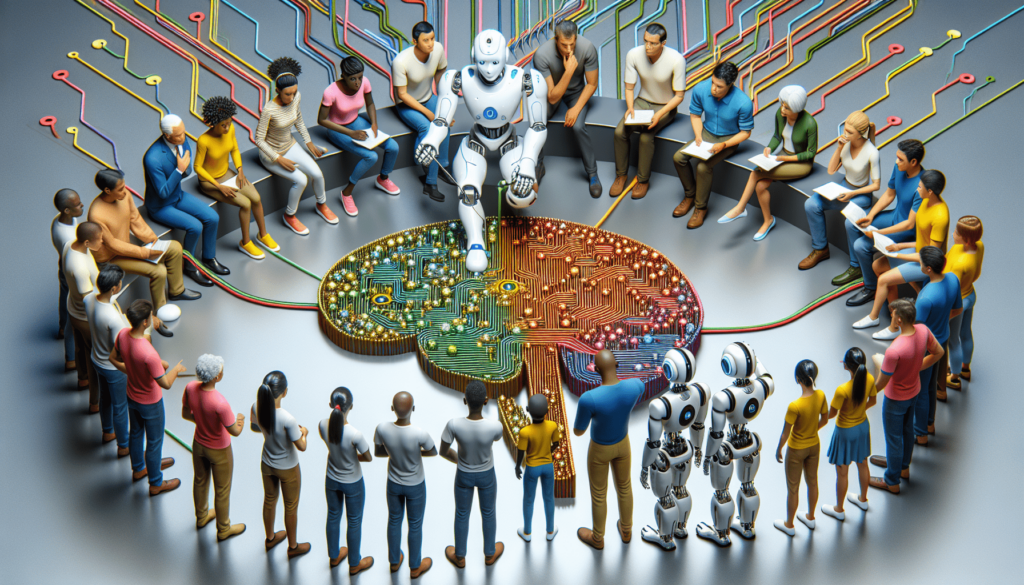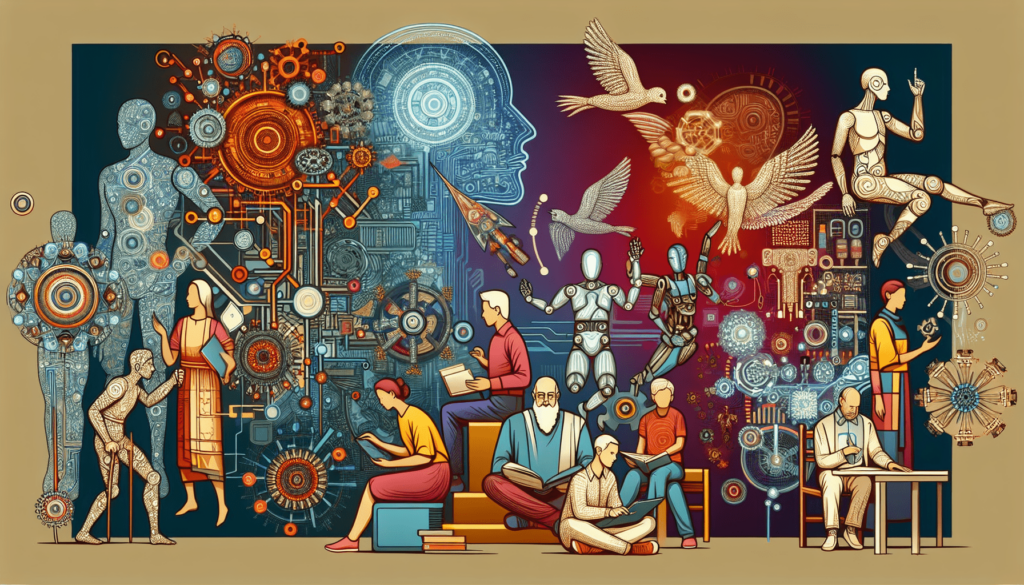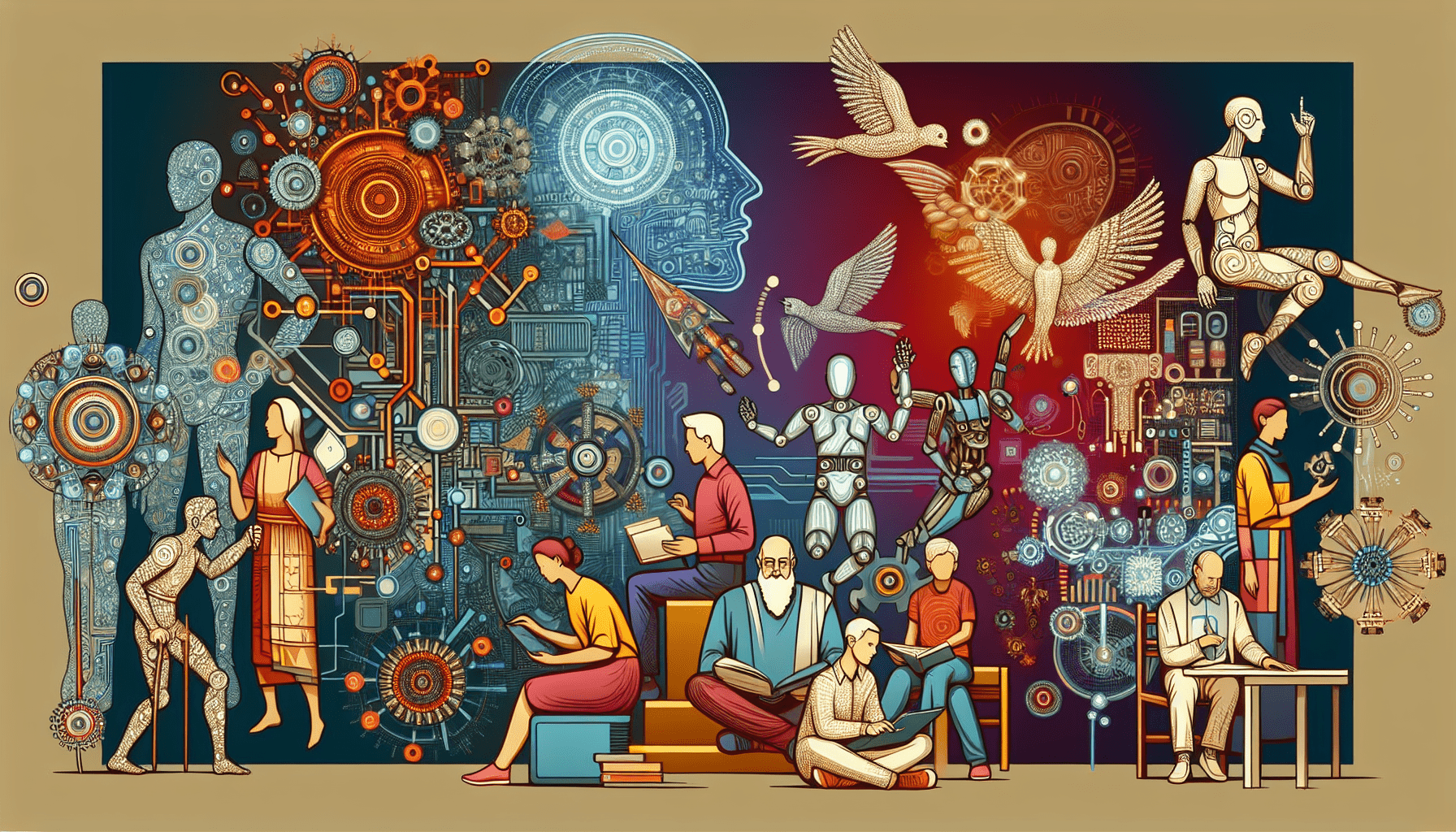Imagine a world where technology can not only revolutionize industries, but also shape the society we live in. This is the exciting promise that emerges with AI development. With advancements in innovation and efficiency, AI holds the potential to unlock new horizons of possibilities, fuel economic growth, and create jobs. However, as we venture into this future, it is crucial to address the ethical concerns that arise alongside the technology. From job displacement to privacy issues, the ethical implications of AI development cannot be ignored. Moreover, the lack of emotional intelligence and the fear of uncontrollable AI raise further doubts about its responsible use. Therefore, ensuring ethical considerations are at the forefront of AI development is imperative. By adopting a continuous learning model and embracing a collaborative approach, we can foster ethical AI development that benefits both individuals and society as a whole, while safeguarding privacy and addressing emerging ethical challenges.

Innovation and Efficiency
Innovation and efficiency are two key drivers of progress in any industry. With the advancements in artificial intelligence (AI) technology, businesses have found new ways to improve productivity and streamline their operations. Automation plays a crucial role in this process by taking over repetitive tasks, freeing up valuable time for employees to focus on more complex and creative tasks. By leveraging AI-powered automation, organizations can achieve higher efficiency levels and optimize resource allocation, leading to increased productivity and cost savings.
Improving productivity through automation
Automation is revolutionizing the way we work and enabling companies to achieve unprecedented levels of productivity. By automating repetitive and time-consuming tasks, employees can spend more time on high-value activities that require critical thinking and problem-solving skills. AI-powered automation systems can analyze vast amounts of data in real-time, identify patterns, and make informed decisions. This not only speeds up processes but also minimizes errors and improves the overall quality of work.
Optimizing resource allocation
Efficient resource allocation is crucial for businesses to maximize their outputs while minimizing costs. AI technologies can optimize resource allocation by analyzing data and patterns to identify areas that can be optimized. For example, AI algorithms can analyze customer behavior and preferences to determine the most effective marketing strategies, reducing costs by targeting the right audience at the right time. This optimization can result in significant cost savings and improved overall efficiency.
Streamlining processes for better efficiency
Streamlining processes is a key aspect of improving efficiency. AI technologies can identify bottlenecks, redundancies, and inefficiencies in business processes and suggest improvements. By automating certain steps and eliminating unnecessary tasks, organizations can streamline their operations and achieve better results. For example, AI-powered chatbots can handle customer inquiries and support, reducing response times and improving customer satisfaction. This streamlining of processes not only saves time and money but also leads to a more efficient and productive work environment.
New Horizons of Possibilities
The rapid advancements in AI technology have opened up new horizons of possibilities across various fields. From healthcare to transportation, AI solutions are transforming industries and pushing boundaries. By harnessing the power of AI, businesses can unlock new opportunities and discover innovative solutions to complex problems.
Exploring new frontiers of technological advancements
With the help of AI, researchers and scientists are exploring new frontiers of technological advancements. AI algorithms can analyze massive amounts of data and identify meaningful patterns and correlations. This has enabled breakthroughs in areas such as drug discovery, genomics, and scientific research. By leveraging AI, researchers can accelerate their pace of discovery and make significant advancements in their respective fields.
Discovering innovative solutions to complex problems
Complex problems require creative solutions, and AI has proven to be a valuable tool in finding those solutions. With its ability to process and analyze vast amounts of data, AI can identify solutions that might not be apparent to human experts. For example, AI-powered algorithms can optimize logistics and supply chain management, leading to more efficient routes and reduced costs. By harnessing AI’s problem-solving abilities, businesses can overcome complex challenges and drive innovation.
Unlocking potential in various industries
AI has the potential to revolutionize a wide range of industries. From manufacturing and finance to agriculture and education, AI technologies can unlock new possibilities and drive progress. In healthcare, AI-powered diagnostic systems can analyze medical images and identify diseases with high accuracy. In agriculture, AI can optimize irrigation and fertilization practices, improving crop yields and reducing resource waste. By embracing AI, industries can tap into its transformative potential and reshape the way they operate.
Economic Growth and Job Creation
AI innovations not only drive economic growth but also create new job opportunities. The integration of AI technologies into various industries stimulates growth, enhances productivity, and fuels innovation. By leveraging AI, businesses can stay competitive in a rapidly evolving market and drive economic development.
Stimulating economic growth through AI innovations
The adoption of AI technologies can stimulate economic growth by boosting productivity and efficiency. By automating tasks and optimizing processes, businesses can achieve higher outputs with the same or fewer resources. This increased productivity leads to economic growth and drives progress in industries. Additionally, AI-powered innovations often lead to cost savings, which can be reinvested in research and development, further driving economic growth.
Creating new job opportunities in AI-related fields
While automation may lead to concerns about job displacement, AI also creates new job opportunities in AI-related fields. As AI technology continues to advance, the demand for AI experts, data scientists, and machine learning engineers is on the rise. These highly skilled professionals are needed to develop, deploy, and maintain AI systems. In addition to technical roles, there is also a growing need for AI ethicists and policy experts who can address the ethical and social implications of AI technologies.
Promoting entrepreneurship and technological advancements
AI innovations have the potential to fuel entrepreneurship and drive technological advancements. Startups and entrepreneurs can leverage AI technologies to develop innovative products and services that fulfill unmet needs in the market. With the right support and access to AI resources, these companies can disrupt industries, create new markets, and drive economic growth. Additionally, advancements in AI technology can pave the way for new breakthroughs in areas such as robotics, natural language processing, and computer vision.
Enhanced Personalization
In today’s hyper-connected world, personalization has become a key factor in customer satisfaction and loyalty. AI technologies enable businesses to tailor products and services to individual preferences, delivering personalized recommendations and experiences.
Tailoring products and services to individual preferences
AI-powered algorithms can analyze vast amounts of data, including customer behavior, preferences, and purchase history. This data can be used to personalize products and services to meet individual needs and preferences. For example, e-commerce platforms can use AI to recommend personalized product suggestions based on browsing history or previous purchases. This level of personalization enhances the customer experience and increases the likelihood of repeat business.
Delivering personalized recommendations and experiences
AI technologies can also improve customer experiences by delivering personalized recommendations and experiences. For instance, streaming platforms use AI algorithms to analyze user preferences and viewing patterns to suggest relevant content. This personalized recommendation system enhances user engagement and satisfaction, leading to increased customer loyalty.
Improving customer satisfaction and loyalty
Personalization plays a crucial role in improving customer satisfaction and fostering customer loyalty. When products and services are tailored to individual preferences, customers feel valued and understood. This level of personalization not only increases customer satisfaction but also strengthens the bond between customers and businesses. By leveraging AI technologies for personalization, companies can enhance customer experiences and create a loyal customer base.
Job Displacement Concerns
While AI brings numerous benefits, there are concerns about job displacement. The automation of tasks traditionally performed by humans raises questions about the future of work and the potential impact on employment opportunities.
Automation replacing human labor in various industries
As AI technologies continue to advance, there is a potential for automation to replace human labor in various industries. Jobs that involve repetitive and predictable tasks are most at risk of being automated. For example, manufacturing processes can be fully automated, eliminating the need for manual labor. This poses a challenge as it can lead to job losses and income instability for displaced workers.

Potential loss of jobs and income for displaced workers
The potential displacement of jobs due to automation raises concerns about income loss and unemployment. Workers in industries that experience significant automation may find it challenging to secure new employment opportunities, especially if their skills are specific to tasks that are being automated. Additionally, there may be a socioeconomic impact, with low-skilled workers facing higher levels of unemployment and income inequality.
Addressing the need for re-skilling and job transition programs
To mitigate the effects of job displacement, there is a need for re-skilling and job transition programs. These programs aim to equip workers with new skills that are in demand in the evolving job market. By providing training and education opportunities, workers can adapt to the changing employment landscape and secure new job opportunities. Governments, educational institutions, and businesses must collaborate to develop and implement comprehensive re-skilling programs to support displaced workers and ensure a smooth transition into new roles.
Ethical and Privacy Issues
As AI becomes increasingly integrated into our daily lives, there are ethical and privacy concerns that need to be addressed. These concerns revolve around data privacy, algorithmic bias, transparency, and accountability in AI systems.
Protecting user data and privacy rights
The collection and use of data are integral to AI systems, but it also raises concerns about privacy and data security. Businesses must ensure that user data is collected, stored, and used in a responsible and ethical manner. There is a need for robust data protection measures, such as encryption and anonymization, to safeguard user privacy rights.
Ensuring transparency and accountability in AI systems
AI algorithms can be opaque and complex, making it challenging to understand how decisions are made. There is a need for transparency and accountability in AI systems to address concerns about bias and unfair outcomes. Organizations should strive to develop AI systems that can be audited and explainable, allowing stakeholders to understand the reasoning behind AI-generated decisions.
Addressing algorithmic bias and discrimination
AI systems are only as unbiased as the data they are trained on. If the training data contains biases, it can lead to discriminatory outcomes. To address this issue, organizations must actively work to identify and mitigate biases in AI systems. This involves diverse and inclusive data sets, rigorous testing, and ongoing monitoring to ensure fairness and prevent discrimination.
Lack of Emotional Intelligence
Emotional intelligence plays a significant role in human interactions, but replicating it in AI systems poses challenges. The lack of emotional intelligence in AI can have a negative impact on human-AI interaction and raise ethical concerns.
Challenges in replicating human emotions and empathy
Emotions and empathy are fundamental to human relationships and interactions. However, replicating these qualities in AI systems remains a challenge. While AI can recognize and analyze emotions to some extent, it is still limited in its ability to genuinely understand and respond to human emotions. This can lead to interactions feeling impersonal or lacking empathy.
Potential negative impact on human-AI interaction
The lack of emotional intelligence in AI can have a negative impact on human-AI interaction. For example, in customer service scenarios, an AI-powered chatbot may not be able to provide the empathy and emotional support that a human agent can. This can result in customer dissatisfaction and frustration. Ethical considerations must be taken into account to ensure that AI systems do not inadvertently harm users or negatively impact their well-being.
Considering ethical implications of emotional manipulation
Emotional manipulation is a significant ethical concern in the development and deployment of AI systems. As AI becomes more sophisticated in analyzing and predicting human emotions, there is a risk of unethical manipulation for commercial or political gain. It is crucial to consider the ethical implications of emotional manipulation and establish guidelines to prevent misuse and protect individuals’ emotional well-being.
Fear of Uncontrollable AI
There is a fear among some individuals and experts about AI systems surpassing human control. The idea of superintelligent AI with the potential to act autonomously raises concerns about unintended consequences and the loss of human agency.
Concerns about AI systems surpassing human control
The concept of superintelligent AI systems, capable of surpassing human capabilities and acting autonomously, leads to concerns about the loss of human control. If AI systems become too advanced or evolve independently, there is a fear that humans may no longer be able to understand or control their actions. This raises concerns about unintended consequences and the potential for AI systems to act against human interests.
Addressing the risks associated with superintelligent AI
To address the risks associated with superintelligent AI, there is a need for robust safety measures and regulations. Developers and researchers should prioritize the development of AI systems that align with human values and prioritize human safety. Additionally, there is a need for ongoing research and interdisciplinary collaboration to understand and mitigate the potential risks associated with superintelligent AI.
Developing robust safety measures and regulations
The development and deployment of AI systems should be guided by robust safety measures and regulations. These measures should ensure that AI systems are designed with human safety in mind and that they adhere to ethical standards. Governments, regulatory bodies, and industry organizations should collaborate to establish guidelines and frameworks to promote responsible and safe AI development.
Ethical AI Development
Ethical considerations should be integrated into the early stages of AI development to ensure that AI systems are developed and deployed in a responsible and accountable manner.
Integrating ethical considerations from the early stages of AI development
Ethics should be a fundamental consideration from the early stages of AI development. This includes defining ethical principles and guidelines that guide the development process. By integrating ethics into the core of AI development, organizations can proactively address potential risks and ensure that AI systems are aligned with societal values.
Promoting responsible and accountable AI practices
Responsible and accountable AI practices are essential for building trust and ensuring the ethical use of AI technologies. Organizations should prioritize the responsible collection and use of data, as well as transparency and explainability in AI systems. Furthermore, mechanisms should be in place to address any potential ethical concerns or issues that arise during the deployment of AI systems.
Establishing ethical guidelines and frameworks
To promote ethical AI development, it is crucial to establish clear ethical guidelines and frameworks that guide organizations and developers. These guidelines should cover areas such as data privacy, algorithmic transparency, and fairness in decision-making. By providing a framework for ethical AI development, organizations can ensure that AI technologies are developed and used responsibly and in the best interest of society.
Ethical and Privacy Issues
Ethical and privacy issues are central to the development and deployment of AI-powered systems. These concerns revolve around the responsible use of data, addressing potential ethical dilemmas, and promoting ethical governance and regulation.
Safeguarding privacy in AI-powered systems
The collection and use of personal data in AI-powered systems raise concerns about privacy. Organizations must have robust data protection measures in place to safeguard user privacy rights. This can include encryption, anonymization, and access controls to ensure that personal data is handled responsibly and securely.
Addressing potential ethical dilemmas in data collection and usage
Ethical dilemmas can arise in the collection and usage of data for AI systems. Organizations should ensure that data collection practices are transparent, informed by appropriate consent, and protect individual privacy rights. Additionally, AI systems should be designed to minimize biases and discrimination, ensuring fairness and equity in decision-making processes.
Promoting responsible AI governance and regulation
To address ethical and privacy concerns in AI development, there is a need for responsible AI governance and regulation. Governments and regulatory bodies should work together with industry stakeholders to establish clear guidelines and regulations that promote the responsible and ethical use of AI technologies. These regulations should strike a balance between innovation and accountability, ensuring that AI development is in line with societal values and ethical standards.
In conclusion, as AI technologies continue to advance, there are numerous opportunities and challenges on the horizon. Innovation and efficiency are driving progress in various industries, unlocking new possibilities and promoting economic growth. However, ethical concerns around AI development must be addressed, including issues such as job displacement, privacy, algorithmic bias, emotional intelligence, and the fear of uncontrollable AI. To ensure responsible and ethical AI development, it is crucial to integrate ethical considerations from the early stages, promote transparency and accountability, and establish clear guidelines and frameworks. By addressing these concerns, we can harness the potential of AI while safeguarding human values and interests.


